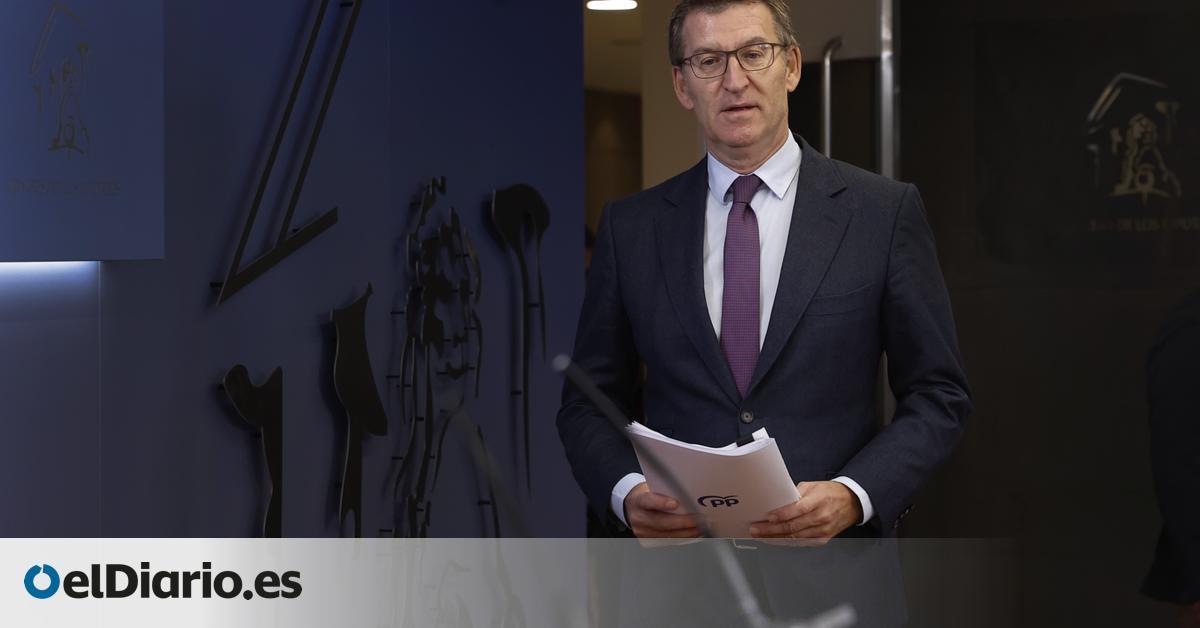
The first week of the year has served to clear up any doubts about the PP’s strategy in the coming months. After three days of silence, it was the parliamentary spokesperson for the popular parties, Miguel Tellado, who on Wednesday finally came out to distance himself from the ultra New Year’s Eve held in Ferraz. Although he did it to point out, in passing, “the victimization strategy” of the PSOE. And that same day he presented an initiative by his group to outlaw pro-independence parties that promote self-determination consultations or referendums.
Tellado, right-hand man of Alberto Núñez Feijóo, is considered one of the “hard” profiles in the current address of Génova Street and is the one who has monopolized the voice of the party in the scarce political activity at the beginning of 2024. The recently appointed spokesperson In Congress, for weeks now, it has publicly set the tone of an opposition to the Government of Pedro Sánchez that, far from undertaking any trip to the center, is trying to keep up with the extreme right in its rejection of the amnesty law. Something that, however, this week has once again proven fruitless.
With a difference of just minutes, on Tuesday two different amendments to the entire amnesty law entered the Register of the Congress of Deputies: one from the PP and another from Vox. The Popular Party had presented with great fanfare in the morning a proposal to reform the Penal Code to make the promotion of independence consultations cause the dissolution of political formations. An idea that the extreme right had already brought to Congress in similar terms during the last legislature and from which the popular ones, until now, had distanced themselves.
This step forward in Feijóo’s offensive against the Government and against the amnesty until he settled on positions typical of the extreme right did not manage this time, however, to reach those of Abascal, who in their amendment text directly promote the imprisonment of Pedro Sánchez. Specifically, Vox speaks of “a new type of crime aimed at punishing those who negotiate matters of the Cortes Generales with those who have been prosecuted or removed from the action of justice for crimes against the Constitution, public order, treason and independence of the State and peace and national defense.” And it is proposed that these crimes be punished with “penalties ranging from six to ten years in prison, in addition to a special disqualification for employment or public office of six to ten years.”
In the PSOE, very critical of the attitude of the popular after the harassment of their headquarters and the harassment of Pedro Sánchez, they assure that Feijóo’s leadership has not even met their own expectations. “Deep down, he disappoints us on the left because he arrived from Galicia as a moderate manager. We had expectations of a stage of more dialogue and understanding and it is in an unstoppable drift towards Vox,” they point out.
Ayuso’s weight in Genoa
Doubts about the Galician politician’s strategy are even within the PP itself. There are those who believe that the digestion of the frustration of the 23J results is proving too heavy for Feijóo and that this is having consequences on the formation of his leadership. These same voices point to lurches like those of this week, when the proposal to outlaw pro-independence parties and Genoa’s justification of the contacts with Junts in view of the investiture of the PP leader coincided in time.
Some of those voices that cast doubt on the Genoa plan believe that Feijóo “misses the mark” by betting everything on the amnesty and leaving aside a more economic discourse. And above all, they believe that, as happened to Pablo Casado, he is also allowing his main territorial influence when designing his political strategy to once again be that of the Madrid president, Isabel Díaz Ayuso.
In fact, in a more or less veiled way, messages in that direction are beginning to arrive in Genoa. The centrist tone of the Andalusian president, Juanma Moreno, has been accentuated in public in recent months in what seems a clear attempt to mark differences with the PP leadership and its support for Puerta del Sol.
“It is unacceptable that a piñata is made with the figure of the President of the Government of all Spaniards so that it can be beaten. Regrettable events like this must always be condemned. Respect and tolerance for the adversary are fundamental,” Moreno said this week in the most resounding condemnation heard from a PP leader regarding the events that occurred in Ferraz.
Those in the PP who doubt the opposition roadmap deployed by their party believe that if Feijóo’s profile of moderation has become blurred in recent months it is due solely and exclusively to his own mistakes. And they point out as an example of this lack of direction and excess of influence from Madrid the photo with Ayuso next to a box of fruit to mock the president’s insult to Pedro Sánchez.
This strategy of permanent offensive against the Government makes almost any agreement between the two main parties impossible. After fifteen days without even agreeing on the date and place, Sánchez and Feijóo met in Congress before the Christmas holidays and only managed to reach a minimum agreement: reform article 49 of the Constitution in order to withdraw the term “disabled” and change it to “people with disabilities”, a measure pending since the previous legislature.
The joint proposal will be registered before the end of the year and both the Government and the first opposition party trust that it can be substantiated in January. Feijóo made it clear then, to reassure those who stalk him from close by and not lose the edge of those who compete from outside, that the agreements ended there.
Source: www.eldiario.es

